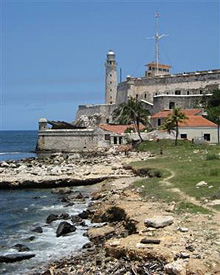 |
 |
 |
 Travel & Outdoors | June 2007 Travel & Outdoors | June 2007  
Preparing for Cuban Vacations After Castro
 Peter Greenberg - TODAYShow.com Peter Greenberg - TODAYShow.com


| | The current law doesn’t specifically bar American tourists from going to Cuba, but it does ban Americans from spending U.S. dollars there. |
Quietly, deliberately, and quickly, the travel industry is preparing for Cuba after Castro.

Major U.S. cruise lines won’t publicly admit this, but each has now charted at least seven, and perhaps eight viable Cuban harbors. It stands to reason that the cruise ships will be first in when the travel rules are changed. After all, they are already floating infrastructure/hotels.

U.S. hotel companies — through their foreign subsidiaries — have been "prospecting," doing handshake deals on properties throughout Cuba, signing quiet conditional deals to kick in the minute things change and they are allowed to do business.

And, despite U.S. administration efforts to the contrary, on any given day in Cuba, there are as many as 2,000 American tourists — no, these aren't the folks who are Cuban Americans visiting friends and relatives. Or officially licensed travelers on humanitarian missions. They are American tourists, who fly in from any of five secondary countries — Bahamas, Jamaica, Canada, Mexico or the Cayman Islands. All eager to experience Cuba before Fidel checks out.

How are they doing this? After all, aren’t U.S. citizens banned from travel to Cuba?

First, some history. There’s a law, still on the books, called the Trading with the Enemies Act. It’s been around since 1963. And for more than 43 years it’s officially banned American tourists from Cuba. Or has it? There are those who would argue that the legislation was specifically aimed at U.S. firms trying to do business in Cuba. Indeed, if you read the law it doesn’t specifically bar American tourists from going to Cuba, but it does ban Americans from spending U.S. dollars there.

So what about those 2,000 American tourists in Havana as you’re reading this? Are they in violation of the law? Certainly they are in violation of the spirit of the law. What they’ve done is book all–inclusive travel through any one of five other countries — Canada, Mexico, Jamaica, the Cayman Islands or the Bahamas. They’ve paid local tour operators there in U.S. dollars for trips that cover their airfare, hotels, transfers, taxes, tips, meals. So, officially, they prepaid in another country, and are not spending U.S. dollars in Cuba. In addition, Cuban authorities do not stamp U.S. passports. Officially, you visited that secondary country and never left that country, when in fact you transited to Cuba.

And, since 1963, how many have been fined or arrested for doing this? It’s actually tough to find any. Why? Some would argue that for the American government — which is surely aware of this long standing practice — to crack down on U.S. tourists would also be to acknowledge how many there are. It’s as if the U.S. government is playing the Claude Raines role in the legendary movie Casablanca, “shocked” to find out there’s gambling in Rick’s casino and then collecting his winnings from the night before. And this is despite even more tightened travel restrictions to Cuba imposed by the Bush administration in 2004.

In fact, American tourists are not only staying in Cuban hotels, many from the Southeastern U.S. are even sailing their pleasure boats into Havana and staying in the Hemingway marina.

(Important note to those considering doing this: Remember, I am not endorsing this behavior, just reporting that it is being done. One additional caution: Should you wish to buy anything in Cuba, be aware that U.S. credit cards are not accepted, and even if you do buy something, that is, of course evidence that you actually were in Cuba, and you are dangerously flirting with a stiff fine, at the very least).

However, times are changing. This past March, Reps. Charles Rangel, D-N.Y., and Jeff Flake, R-Ariz., cosponsored HR 654 — a bill calling for an end to the restrictions of Americans traveling to Cuba. The bill would also allow all U.S. companies to compete in booking trips to Cuba. This may mark the first time such a bill gets strong bipartisan support.

Flake depicted the fading health of long-time Cuban leader Fidel Castro as a time for a new approach to Cuban-America relations.

“For nearly 50 years our current Cuba policy has done little to bring democracy to Cuba,” Flake said in a statement.

“Far from hastening democratic reforms, our current policy has given Fidel Castro a convenient scapegoat for his own regime’s failures. With the Cuban government taking new shape, we shouldn’t give the new leader the same excuses we’ve given the old one,” Flake said.

The bill reads, “The president shall not regulate or prohibit, directly or indirectly, travel to or from Cuba by United States citizens or legal residents, or any of the transactions incident to such traveling.” In other words, the travel ban would disappear.

Of course, all of this is having a big ripple effect throughout the rest of the Caribbean. Tourism ministers from just about every Caribbean country are worried — as they should be — that the minute Castro goes, their tourism numbers could drop as much as 20-25 percent, with Americans flocking to Cuba to be first on their block.

Indeed, for the first time in nearly 44 years, Cuba may be no longer officially off-limits. Stay tuned...

Peter Greenberg is TODAY's travel editor. His column appears weekly on TODAYshow.com. Visit his Web site at PeterGreenberg.com. | 
 | |
 |



